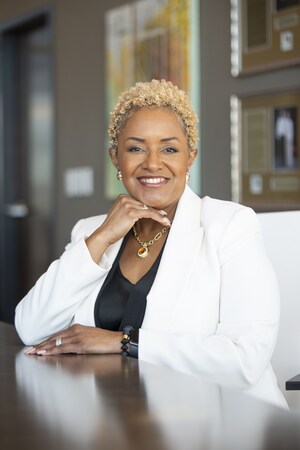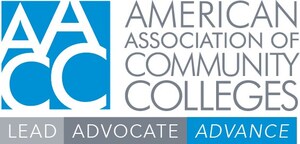
ALBEMARLE, N.C., March 22, 2024 /PRNewswire/ --
The following is written by Dr. John Enamait, President, Stanly Community College, a member of the American Association of Community Colleges.
When analyzing completion data, it became clear that academic advising was a key component to successfully navigating academic pathways.
Historically, Stanly Community College (SCC) provided optional academic advising and registration using faculty advisors. In 2014, SCC implemented mandatory first-year student advising, but many barriers to quality advising remained. Teaching schedules, committee work, and other responsibilities limited faculty's time to meet with students. Many faculty worked 9-month contracts and were unavailable during the summer. Scheduling with faculty was difficult and students looking for drop-in guidance often found their advisor in class. Students would have to meet with another advisor, resulting in retelling challenges, goals, and preferences. Limited time for advisor training resulted in students receiving conflicting information and frequently being referred to other departments for additional answers. Faculty were at capacity, with limited time to innovate, learn new technology, or develop new instructional skills. As a result, the 2015 SCC's IPEDS 150% graduation rate was 18%.
To combat this, SCC added a backup, part-time transfer advisor in 2014. Over the next three years, the part-time advisor provided basic advising for most transfer students to reduce transfer faculty workloads. An early alert system was also implemented during this timeframe, with new retention specialists following up with students about instructor concerns. Faculty advisors, a part-time advisor, retention specialists, and others were all attempting meaningful conversations with students, resulting in duplication and confusion.
SCC's AACC Pathways Project work reinforced the need for high-impact pathways for students and a single point of contact for advising, registration, and interventions. In 2018, SCC implemented a professional advising model and reallocated resources to hire seven success coaches for advising and retention support. Success coaches were assigned by program of study clusters for consistent, quality advising for the first 30-hours and support throughout each student's program. Having success coaches allowed for more standardized training and procedures.
Success coaches for a handful of programs piloted full program mandatory advising in Fall 2019. Over the next 3 years the college expanded full, mandatory advising to all programs. By 2023, SCC had expanded to ten full-time and two part-time coaches.
Coaches conduct intake surveys with new students and follow up on needs identified in student climate surveys, then connect students to support resources. This practice helped SCC maintain contact with students throughout the pandemic and was instrumental in sustaining SCC's course success rate improvement trend.
Success coaches also provided faculty with expanded capacity to implement new technology for teaching and student engagement, which was especially beneficial throughout the pandemic. Faculty have also collaborated with SCC's Center for Teaching and Learning, established in 2020, to redesign courses with Open Educational Resources to reduce economic barriers and close equity gaps.
An example of innovation due to additional faculty bandwidth is the development of contextualized gateway English courses for Early Childhood Education (EDU) students, who are frequently working adults and tend to be ethnically diverse. Previous EDU students' gateway English success rate was 45% compared to 66% for non-EDU students in AY2017. AY2023 data showed overall improvement in success rates for the course, with EDU students in contextualized English sections succeeding at 75% compared to 78% overall. The equity gap for EDU students fell from 21% to 3%.
The results of the Success Coach model have been dramatic. SCC's IPEDS 150% graduation rate has improved from 18% in 2015 to 56% in 2022. The IPEDS Fall-to-Fall retention rate for full-time students increased from 53% in 2013 to 83% in 2022. Part-time retention rates remained steady, even during the pandemic. Successful course completion rates rose from 77% in AY2014 to 85% in AY2023 while withdrawal rates fell from 15% to 11%. The Success Coach model has also increased the applicant conversion rate from 49% in 2015 to 58% in 2022.
SCC was recognized at the 2023 Online Learning Innovations Summit for having online course success rates (83%) comparable to seated success rates (85%) for the combined Fall 2020, 2021, and 2022 terms. SCC's online course success rates were the highest in the North Carolina Community College System (NCCCS) and significantly higher than the overall NCCCS rate of 71%. SCC online courses also had the smallest equity gaps for age and race/ethnicity in the system.
Representative student quotes from qualitative survey data indicate student satisfaction with the Success Coach model, such as:
- "[My success coach] has always been willing to help, and [is] very supportive, and I feel like she cares about my success at SCC."
- "I would like to recognize [my success coach]. She is very helpful and loves to see you succeed. I'm so thankful to have her as my advisor."
Students' perception of advising as "very important" or "somewhat important" on the CCSSE survey increased from 90% in 2017 to 95% in 2023. During the pandemic, with most students online and success coaches as the primary connection beyond the online classroom, this metric rose as high as 99%. The percentage of students indicating they were "very satisfied" or "somewhat satisfied" with academic advising has increased from 79% in 2017 to 97% in 2023.
SCC learned several lessons implementing its Success Coach advising model that would be helpful for replicating success. Most importantly, colleges must be willing to ask difficult questions, answer them honestly, and determine if current practices are the best for their students. Colleges should not be afraid to try new strategies and should be willing to adjust as students' needs change or as data indicates. Colleges should consider if student advising and faculty training models are prepared to handle the unexpected, like pandemics, natural disasters, or economic upheavals.
Within the Success Coach advising model, it is important to include faculty on interview committees and to embed coaches alongside program faculty. Breaking down silos helps provide more effective holistic student support. It is important to provide coaches with frequent training, as resources, policies, procedures, and tools change. Do not backfill faculty responsibilities; instead, allow time to innovate, enhance, and modernize courses and instruction to meet students' diverse needs. Implement a Center for Teaching and Learning for training on quality, equity, technology, and substantive engagement with students. Finally, build a culture that supports continuous improvement for both advising and instruction.
Uniquely American, community colleges serve more than 10 million students annually, providing critical access to higher education in academic and workforce development. As the voice of the nation's community colleges, the American Association of Community Colleges (AACC), delivers educational and economic opportunity for more than 10 million diverse students in search of the American Dream. Uniquely dedicated to access and success for all students, AACC's member colleges provide an on-ramp to degree attainment, skilled careers, and family-supporting wages. Located in Washington, D.C., AACC advocates for these not-for-profit, public-serving institutions to ensure they have the resources and support to increase economic mobility for all. https://www.aacc.nche.edu/.
SOURCE American Association of Community Colleges






Share this article